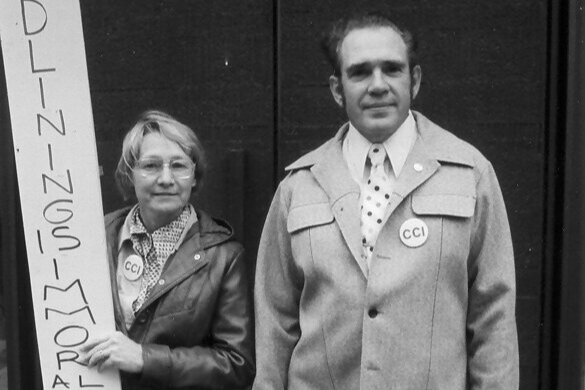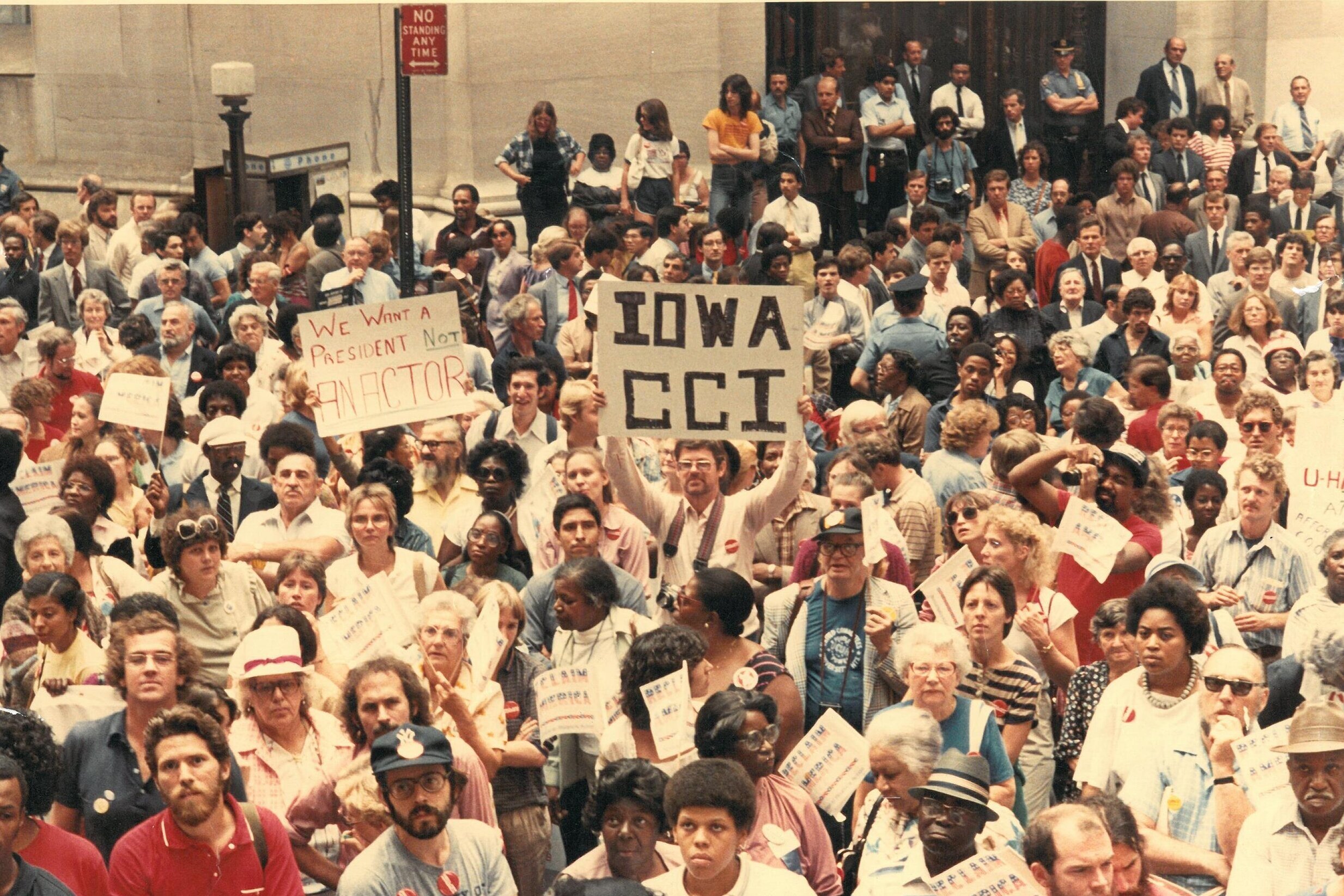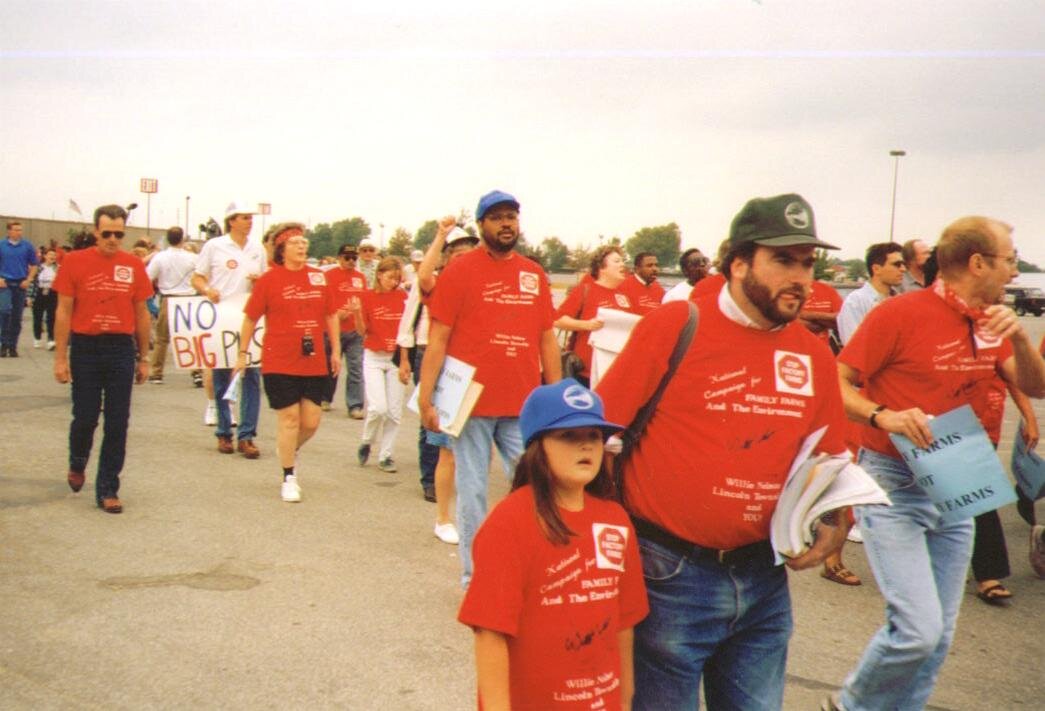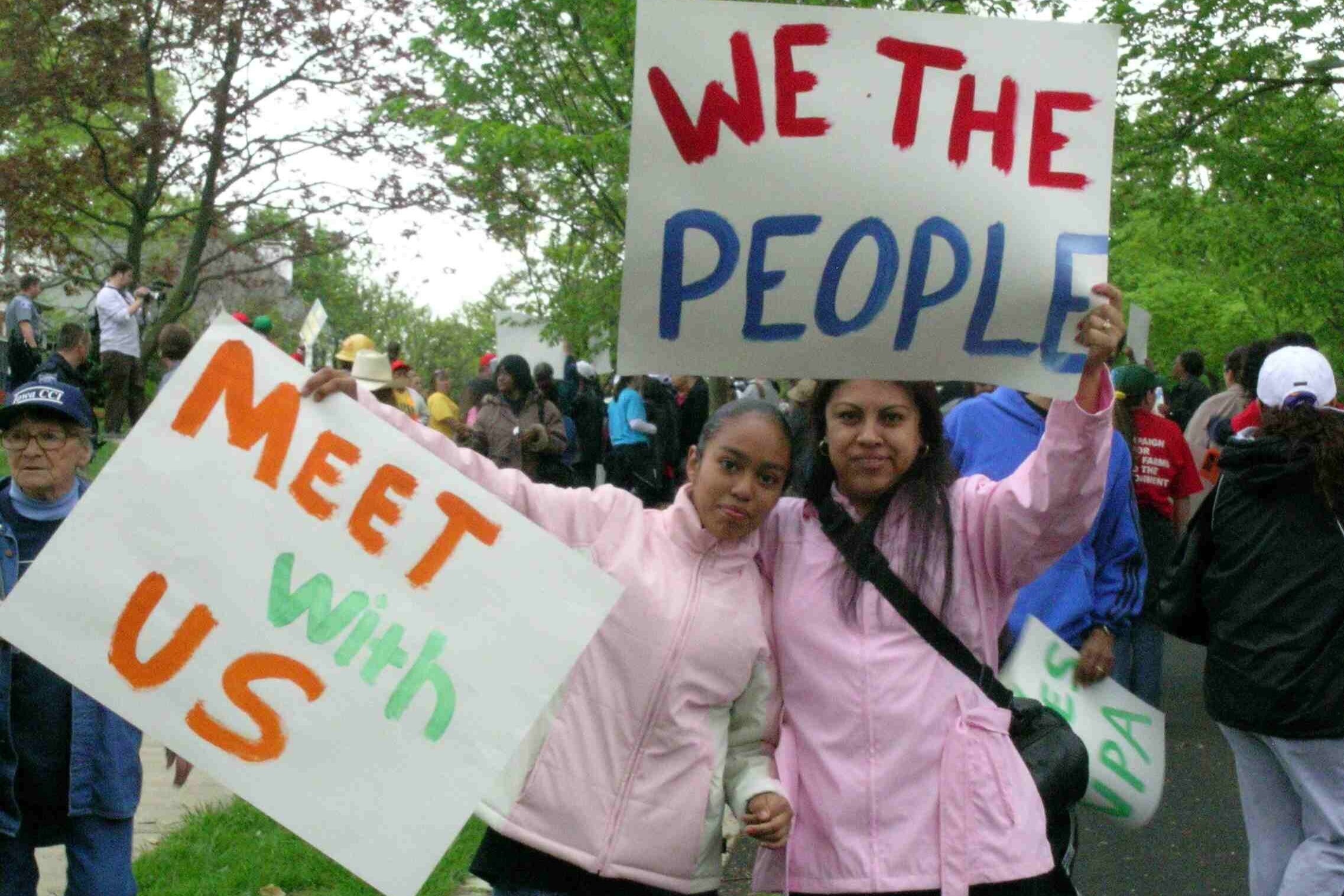Almost 50 Years of
Putting People First
Iowa Citizens for Community Improvement was born, rather humbly, in the rectory of St. Joseph’s Catholic Church in Waterloo. We were founded by a handful of clergy who believed that ordinary people, when given the chance, can be a powerful force for justice when we organize for change together.
From four priests in Waterloo to today’s statewide, multi-racial, multi-gendered, multi-generational movement, Iowa CCI’s spirit of justice marches on. That’s thanks to the work of thousands of members like you, across the state, who continue to tackle tough issues and get things done.
The 1970s: Local Organizing
After our founding in 1975, we quickly grew to include Cedar Rapids, Council Bluffs and Des Moines. We built our people-powered organizing around local and neighborhood issues, addressing abandoned housing, use of city funds, and slum landlords who weren’t providing safe living conditions to their tenants.
+ Our 1970s Wins
- CCI members helped pass the Iowa Uniform Residential Landlord and Tenant Act, an important state law that still holds landlords accountable for fair treatment and decent living conditions.
- When city leaders and greedy developers tried to use federal grant money to gentrify communities and line their own pockets, we fought back and won investments in low- and moderate-income neighborhoods.
- Our work on racist and unfair mortgage practices known as redlining resulted in the Neighborhood Revitalization Law, which lets cities incentivize investments in older and low-income neighborhoods.
- Members established affordable healthcare in Waterloo, through the Peoples Community Health Clinic. This clinic, which started in the basement of a church, now has its own permanent location and serves patients in nine languages.
The 1980s: Urban and Rural Together
In the 1980s, we expanded to Dubuque and Sioux City, and then we quickly went statewide. Our organizing branched out to include farmers and rural residents, who joined their neighbors and friends in Iowa’s cities. We organized on issues that cut across urban-rural divides, and we focused on larger targets: utility monopolies and the big banks. We put people first on issues of high utility rates and farm foreclosures.
+ Our 1980s Wins
- The work that CCI members did in the 1980s amounts to more than $100 million in people-first investments. We saved family farms from foreclosure, negotiated affordable mortgage loans in underserved areas, and kept utilities affordable with gas and electric rate reductions.
- Our tenant organizing in Sioux City quickly spread to other communities, which resulted in a winter moratorium of heat and electricity shutoffs. We won fair loans for urban and rural Iowans in previously redlined neighborhoods, and we were the first group to use the Community Reinvestment Act to win fair loans in rural communities.
- During the farm crisis, we launched our first statewide farm organizing campaign, and helped more than 1,200 farmers in 27 Iowa communities obtain nearly $37 million in credit. We stopped farm foreclosures and renegotiated over 200 loans that saved family farmers $4 million.
The 1990s: Here to Stay
In the 1990s, we made two of the “best decisions we’ve ever made.” We became a dues-paying membership organization, and we bought our own office building. Both moves signaled that Iowa CCI would be around to put people and planet first for the long haul. As our membership grew across the state, we continued to organize on issues affecting both rural and urban Iowans. We fought predatory loans, addressed the drug crisis in Des Moines, and helped rural residents fight corporate-backed factory farms.
+ Our 1990s Wins
- In the 1990s, Iowa’s countryside began to change. Corporate-backed factory farms moved in to our rural commmunities. They pushed family farmers out of business, disrupted our quality of life, and polluted Iowa’s rivers, lakes and streams. CCI members fought back, stopping factory farms at the local and statewide levels and taking on corporate concentration in agriculture.
CCI members also organized against drug dealing in Des Moines and Waterloo. New CCI youth leaders won big policy victories with our signature neighbor-to-neighbor organizing, and we established a community patrol to stop drug dealing that children faced on their way to and from school. During this time, our members also advocated for increased arrests and stricter drug enforcement, policies that we no longer support because they contribute to the racist “War on Drugs.”
(Today, CCI's vision of neighborhood safety is shifting towards community connection, not community control. We support initiatives to decriminalize marijuana statewide, and we believe in fully funding schools and social services by defunding the police.)
The 2000s: Lifting Up a Bold Vision
In the 2000s, CCI’s urban and rural members came together around a common struggle, and we communicated a shared vision for Iowa. We were still working on issues that “hit home” for everyday Iowans, but we also began to articulate a broad vision of economic, environmental, and racial justice, naming corporate power as a driving force behind all of our issues. We started organizing with immigrant Iowans on police and workplace issues, our work on racist redlining pivoted to taking on predatory mortgage lenders, and we put CCI members’ voices squarely on the national level by hosting the 2007 Heartland Presidential Forum with five presidential hopefuls, including future President Barack Obama.
+ Our 2000s Wins
- We won lending agreements with the top four subprime mortgage lenders in Iowa, changing the way shady lenders did business and helping families reclaim over $5 million in assets.
- We started Iowa CCI's first Latino-led organizing chapters: in Marshalltown in 2003 and in Des Moines in 2004. CCI members got action on issues of fair treatment in the workplace and from law enforcement, and we connected immigrant struggles to the dangers of Iowa's corporate food and farm system.
- We stopped nearly 50 factory farms from building in communities across the state and forced the Iowa Department of Natural Resources to levy fines for environmental violations.
The 2010s: Building the Future We Deserve
In the 2010s, in solidarity with the Standing Rock Sioux tribe, we engaged thousands of affected Iowans in the fight against the Dakota Access Pipeline, and we stopped dozens of factory farms and a slaughterhouse from setting up shop. We fought racial profiling in Des Moines and anti-immigrant policies across the state, including unfair workplace policies that enabled wage theft. We cut the number of Iowa’s predatory payday lenders in half, and we pushed for minimum wage increases in several Iowa towns and cities.
Increasingly, CCI members realized we can’t make the change we want without getting involved in elections. In 2011, members launched Iowa CCI Action Fund (CCI Action), our sister organization with political ambition. CCI Action gave us new organizing tools - allowing us to name names in elections and work to elect smart progressive, accountable people that come from our movements to office. Learn more about CCI Action at this link.
+ Our 2010s Wins
- Iowa CCI members played roles in Iowa's Occupy movement, leading demonstrations against big banks like Wells Fargo and Bank of America for their role in the mortgage crisis and funding private prisons .
- With 10,000 Iowans, CCI members launched the statewide Clean Water Fight, pressuring the U.S. Environmental Protection Agency to force the Iowa Department of Natural Resources (DNR) to fully implement the U.S. Clean Water Act for factory farms.
- As part of the national Fight for $15, CCI members joined a coalition of local unions and people-powered organizations to win minimum wage increases in Polk, Linn, Wapello, Johnson, and Lee Counties. Statehouse politicians would later pass a rule preempting these local control measures and undoing Iowans' wage increases.
- We made wage theft a statewide issue, winning back nearly $200,000 in stolen wages for (primarily immigrant) workers.
- Our organizing cut the number of payday lenders in Iowa in half. We won ordinances in Ames, Cedar Rapids, Clive, Dubuque, Des Moines, Iowa City, Waterloo, West Des Moines, and Windsor Heights that stopped these harmful lenders from setting up shop and charging high interest rates.
- Our Iowa organizing against the Dakota Access Pipeline delayed the construction and permitting process for a year longer than any other state the pipeline passed through. CCI members, including land owners and other water protectors, did the first civil disobedience arrests that spurred statewide resistance once the permitting process failed Iowans.
The 2020s (and beyond!)
The 2020s are just beginning, but Iowa CCI members are still working on some of the most pressing issues of our time. People need pandemic relief and much more – including a $15 minimum wage, health care and racial justice for all, fair prices for family farmers, a Green New Deal, and full and fair voting rights for everyone, no exceptions – and Iowa CCI is going to organize until we get it. We have no time to waste.
+ Our Vision for the 2020s
We’re working to keep Iowa communities safe with a statewide moratorium on factory farms and a statewide ban on racial profiling.
We’re fighting to get profits out of healthcare with Medicare for all, and to get big money out of our political system with democracy reforms that protect voting rights.
We’re fighting to fund Iowa schools, hospitals, and community services.
We’re working for long-term solutions that put people before profits, and a food and farm system that works for farmers, eaters, and the environment.







